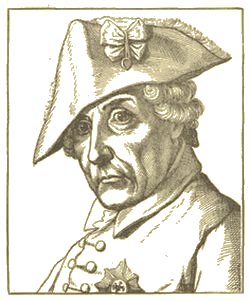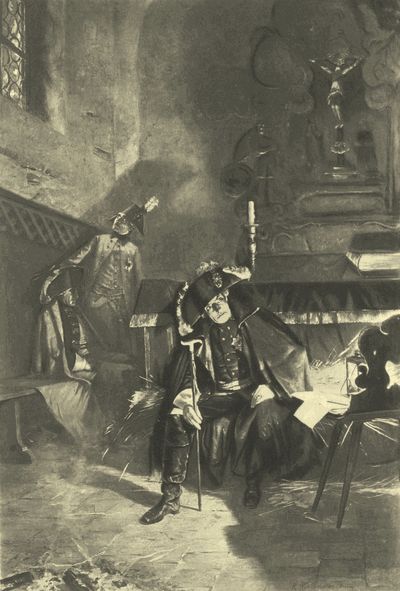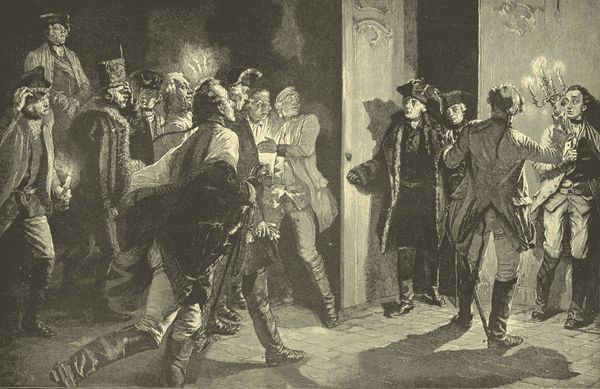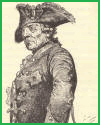 Frederick the Great, born Frederick II on January 24, 1712, in Berlin, was one of the most influential and celebrated monarchs of Prussia. He reigned from 1740 until his death in 1786, transforming Prussia into a major European power through his military acumen, administrative reforms, and patronage of the arts and Enlightenment ideals.
Frederick the Great, born Frederick II on January 24, 1712, in Berlin, was one of the most influential and celebrated monarchs of Prussia. He reigned from 1740 until his death in 1786, transforming Prussia into a major European power through his military acumen, administrative reforms, and patronage of the arts and Enlightenment ideals.
 Frederick's early life was marked by a difficult relationship with his father, King Frederick William I, who was strict and militaristic. Despite this, Frederick developed a deep appreciation for literature, philosophy, and music, influenced by the Enlightenment thinkers of his time. When he ascended to the throne in 1740, he quickly demonstrated his military prowess by successfully claiming Silesia during the War of Austrian Succession, despite being significantly outnumbered.
Frederick's early life was marked by a difficult relationship with his father, King Frederick William I, who was strict and militaristic. Despite this, Frederick developed a deep appreciation for literature, philosophy, and music, influenced by the Enlightenment thinkers of his time. When he ascended to the throne in 1740, he quickly demonstrated his military prowess by successfully claiming Silesia during the War of Austrian Succession, despite being significantly outnumbered.
Frederick's military successes continued throughout his reign, most notably during the Seven Years' War (1756-1763), where he defended Prussia against a coalition of major European powers. His strategic brilliance and innovative tactics earned him the reputation of a military genius and solidified Prussia's status as a formidable force in Europe.
Beyond his military achievements, Frederick the Great was a reformer who modernized Prussia's bureaucracy and legal system. He promoted religious tolerance, economic development, and education, fostering a more efficient and progressive state. His efforts to centralize and streamline administration helped lay the groundwork for a modern, effective government.
 Frederick was also a patron of the arts and an advocate of Enlightenment ideals. He corresponded with leading intellectuals, including Voltaire, and made significant contributions to Prussian culture by building the Rococo palace of Sanssouci, which became a center of intellectual and artistic activity.
Frederick was also a patron of the arts and an advocate of Enlightenment ideals. He corresponded with leading intellectuals, including Voltaire, and made significant contributions to Prussian culture by building the Rococo palace of Sanssouci, which became a center of intellectual and artistic activity.
Frederick the Great died on August 17, 1786, leaving behind a legacy of military brilliance, enlightened absolutism, and significant cultural contributions. His reign marked the emergence of Prussia as a key player in European affairs and set the stage for its future unification under the German Empire.
|
 Frederick the Great, born Frederick II on January 24, 1712, in Berlin, was one of the most influential and celebrated monarchs of Prussia. He reigned from 1740 until his death in 1786, transforming Prussia into a major European power through his military acumen, administrative reforms, and patronage of the arts and Enlightenment ideals.
Frederick the Great, born Frederick II on January 24, 1712, in Berlin, was one of the most influential and celebrated monarchs of Prussia. He reigned from 1740 until his death in 1786, transforming Prussia into a major European power through his military acumen, administrative reforms, and patronage of the arts and Enlightenment ideals.
 Frederick's early life was marked by a difficult relationship with his father, King Frederick William I, who was strict and militaristic. Despite this, Frederick developed a deep appreciation for literature, philosophy, and music, influenced by the Enlightenment thinkers of his time. When he ascended to the throne in 1740, he quickly demonstrated his military prowess by successfully claiming Silesia during the War of Austrian Succession, despite being significantly outnumbered.
Frederick's early life was marked by a difficult relationship with his father, King Frederick William I, who was strict and militaristic. Despite this, Frederick developed a deep appreciation for literature, philosophy, and music, influenced by the Enlightenment thinkers of his time. When he ascended to the throne in 1740, he quickly demonstrated his military prowess by successfully claiming Silesia during the War of Austrian Succession, despite being significantly outnumbered.
 Frederick was also a patron of the arts and an advocate of Enlightenment ideals. He corresponded with leading intellectuals, including Voltaire, and made significant contributions to Prussian culture by building the Rococo palace of Sanssouci, which became a center of intellectual and artistic activity.
Frederick was also a patron of the arts and an advocate of Enlightenment ideals. He corresponded with leading intellectuals, including Voltaire, and made significant contributions to Prussian culture by building the Rococo palace of Sanssouci, which became a center of intellectual and artistic activity.









